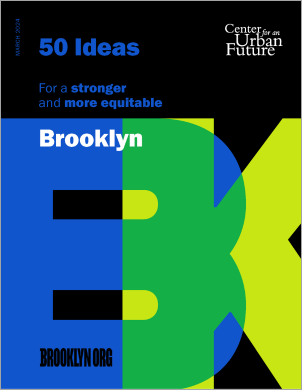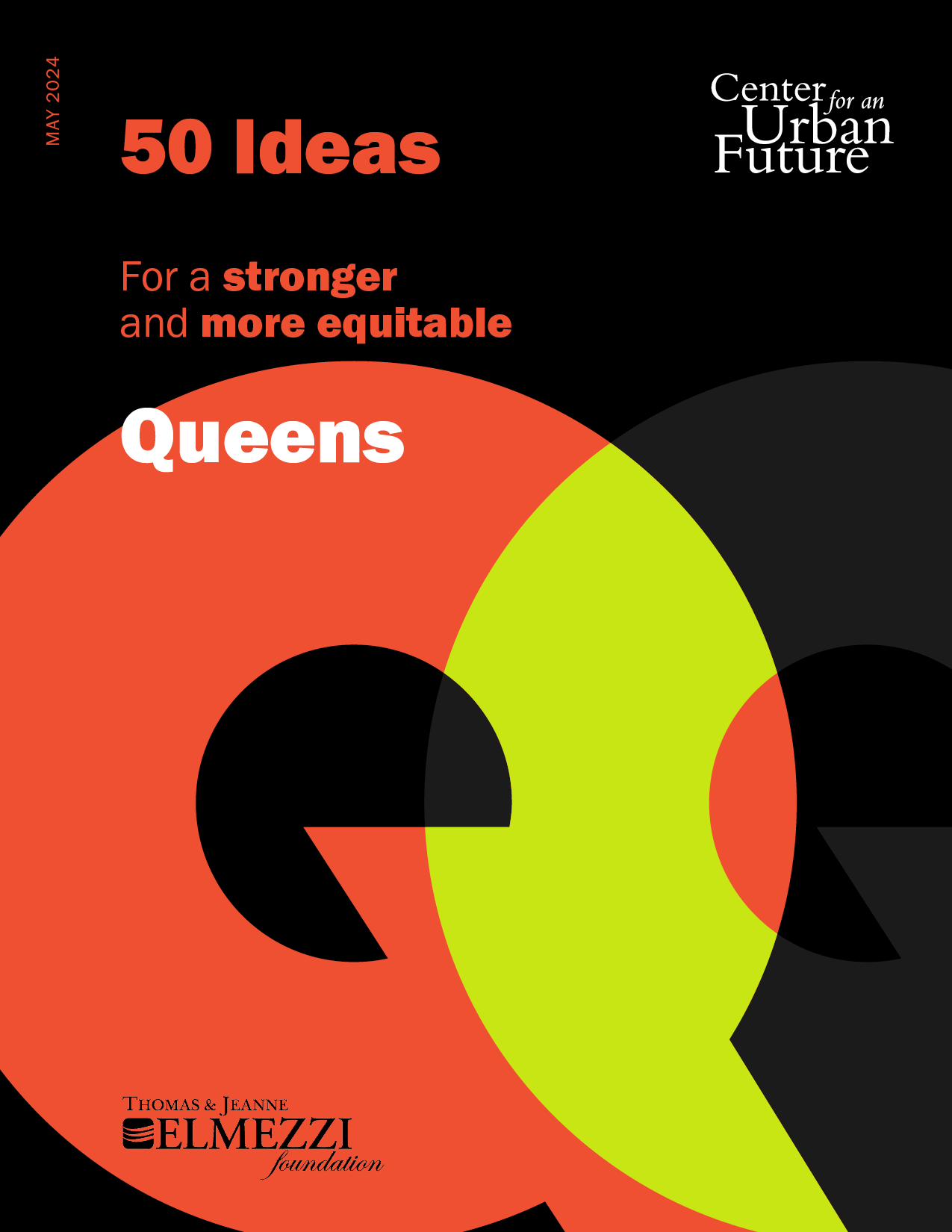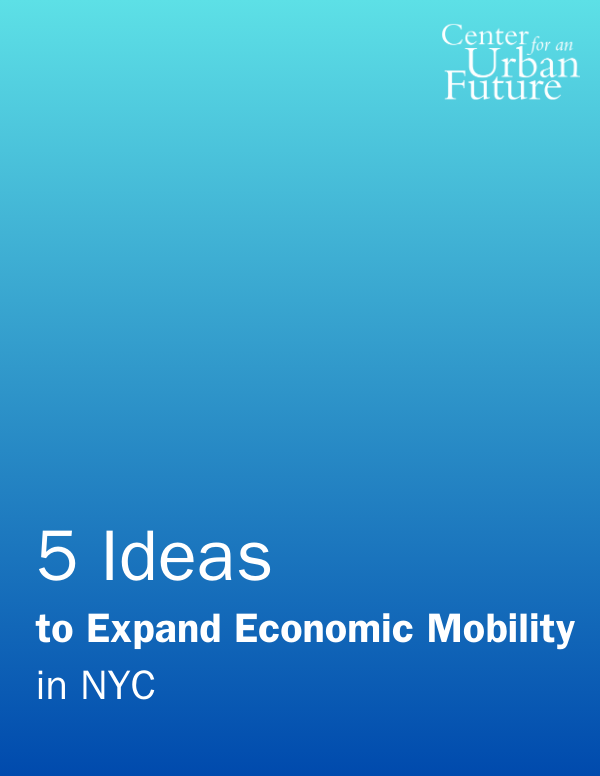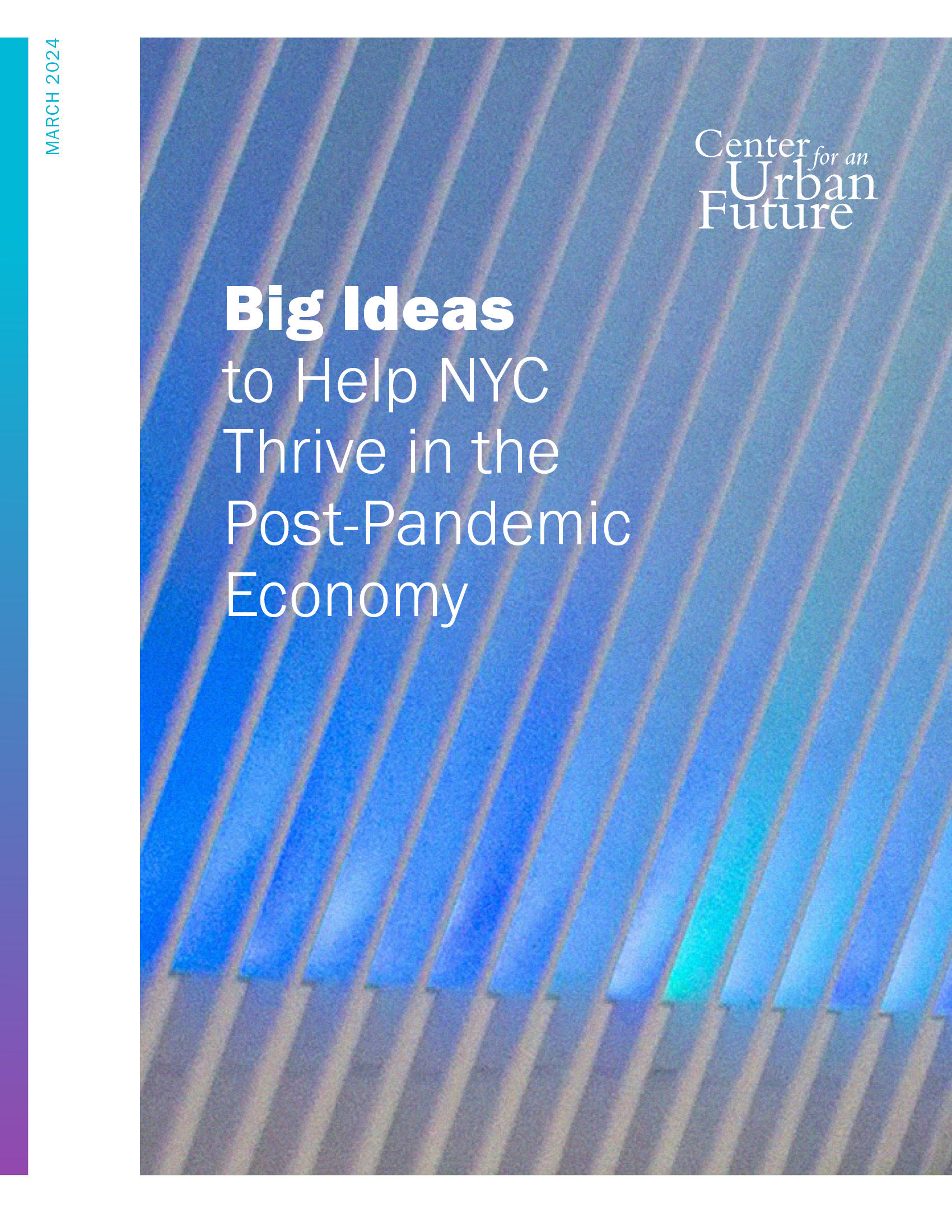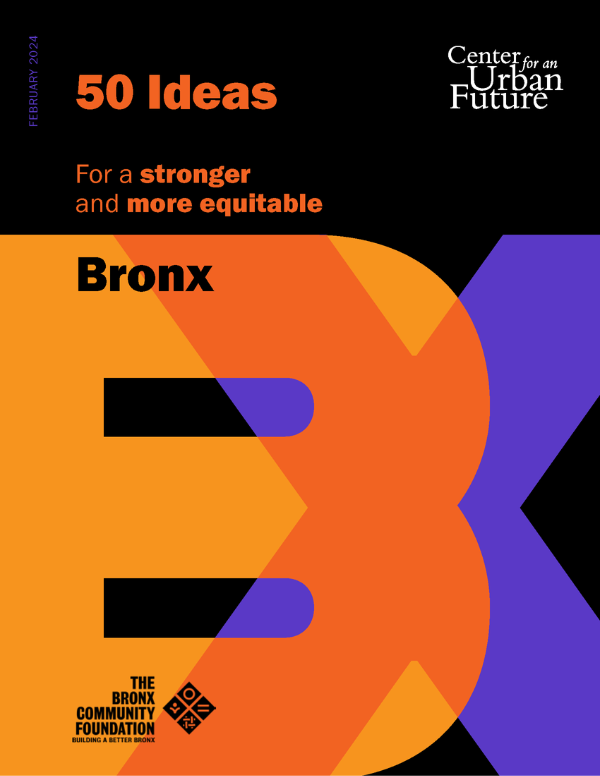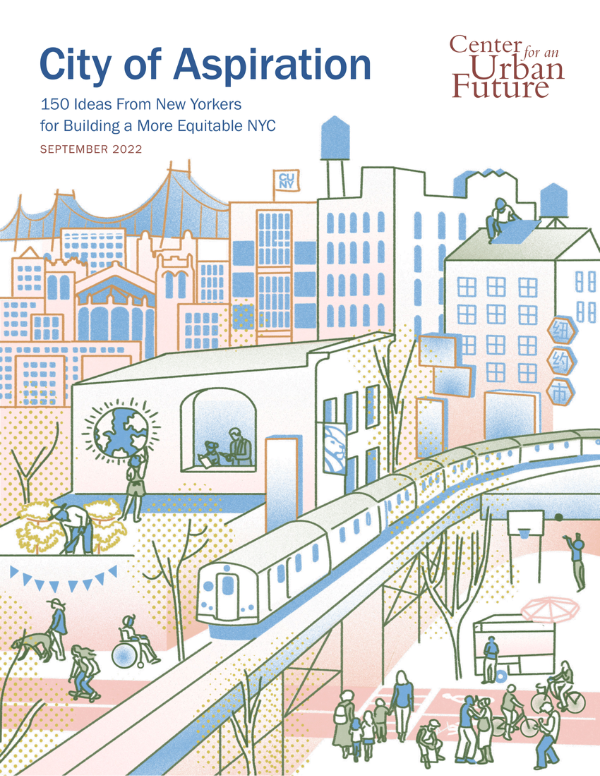- The following is the introduction and full list of ideas from 50 Ideas for a Stronger and More Equitable Brooklyn.
- Click here to explore the full report and read all of the practical and visionary ideas contributed by 50 exceptional Brooklynites.
In many ways, Brooklyn is a shining star of the city's post-pandemic recovery. Since the depths of 2020, Brooklyn’s jobs rebound has outpaced every other borough, building on a two-decade period in which total employment nearly doubled. The borough is experiencing a sustained boom in new businesses, with bustling commercial corridors from Bedford-Stuyvesant to Bay Ridge. Meanwhile, Brooklyn’s thriving tech sector and creative economy are growing at a faster rate even than Manhattan’s. Many of Brooklyn’s neighborhoods have bounced back strong, and several are among the city’s leaders in developing open streets and other innovative placemaking strategies.
Despite all the progress, Brooklyn has significant work to do to ensure all of its residents can fully participate in the borough’s growing prosperity—or even remain in a borough where rents are rising much faster than most incomes. Brooklyn is now among the nation’s top 10 counties with the greatest income disparities, and the borough’s racial wealth gap has only widened in recent years. The borough is home to a growing number of millionaires, but also more than 500,000 residents living below the poverty line—a sum larger than the total population of Atlanta. These challenges are compounded by persistent gaps in educational attainment that point to underlying inequalities: while 79 percent of Park Slope and Carroll Gardens residents hold a bachelor’s degree or higher, just 20 percent of residents do in East New York.
Once known for its high levels of Black homeownership, Brooklyn now has the highest home foreclosure rate in the city, and large numbers of low- and moderate-income residents have exited the borough for more affordable locales. Indeed, an alarming number of Brooklynites face grave affordability challenges, as well as gaps in access to health care, education, open space, technology, and financial services. And despite Brooklyn’s depth of talent, too few residents are accessing the well-paying jobs being created in the borough and beyond.
Brooklyn is also grappling with a lot of the same crises felt throughout the city—from integrating asylum seekers into overstretched communities to providing resources that implement preventive solutions to mental health challenges, to delivering for residents facing a desperate shortage of affordable housing.
The borough also benefits from emerging opportunities that play to Brooklyn’s strengths. The new reality of hybrid work is benefiting neighborhoods across the borough, as residents spend more weekdays closer to home. And new development is coming to neighborhoods, including the rezoning of Gowanus and clean-up of the Gowanus Canal, and East New York’s 27-acre, 2,600 unit wellness-focused affordable housing development.
There is already broad agreement that addressing the borough’s disparities, and laying the foundation for a stronger and more equitable borough, will require bold action and fresh ideas. But there is much less consensus on the specific actions that should be taken. This report aims to narrow that gap. The report—the second in a series of forthcoming reports by the Center for an Urban Future that set forth concrete ideas for bolstering each of the five boroughs—presents 50 bold policy ideas for what Mayor Adams, City Council members, Brooklyn Borough President Reynoso, and other city leaders can do to create a stronger, more equitable Brooklyn.
The 50 ideas in this report—a joint project between the Center for an Urban Future and Brooklyn Org, the borough’s community-led philanthropic platform and its largest racial justice grantmaker—all emanate from leaders across Brooklyn. To generate fresh and achievable ideas for the borough’s future, together we turned to a diverse mix of 50 exceptional Brooklynites who are all committed to building a stronger, more just, and equitable borough. Those contributing an idea to the report include community advocates, social entrepreneurs, heads of social service nonprofits, business owners, educators, economists, urban planners, artists, designers, public health experts, faith leaders, and more. We asked each of them to contribute a single policy idea that would help more Brooklyn residents get on the path to the middle class, strengthen social infrastructure, address the affordability crisis, close longstanding racial and ethnic opportunity gaps, improve the health of residents, and bolster neighborhoods across the borough. This report contains ideas both practical and visionary.
50 Ideas for a Stronger and More Equitable Brooklyn
- Reimagine the brownstone to help address Brooklyn’s housing crisis
Jonathan Marvel, Founding Principal, Marvel - Provide free legal representation to the growing number of Brooklyn homeowners facing foreclosure
Lurie Daniel Favors, Executive Director, Center for Law and Social Justice at Medgar Evers College - Develop community-owned solar canopies over parking lots and warehouse rooftops in Sunset Park
Elizabeth Yeampierre, Executive Director, UPROSE - Leverage major transportation projects planned for Brooklyn to strengthen low-income communities and prevent displacement
Michelle de la Uz, Executive Director, Fifth Avenue Committee - Turn empty storefronts into new public marketplaces for Brooklyn’s micro-businesses
Gregg Bishop, Executive Director, Joe and Clara Tsai Foundation’s Social Justice Fund - Revamp the affordable housing lottery to help long-time Brooklyn residents stay in their neighborhoods and build a larger constituency supporting new affordable housing developments
Vivian Liao, Principal and Co-Founder, Totem - Open mental health care centers designed to serve Brooklyn’s recent arrivals
Lorena Kourousias, Executive Director, Mixteca - Cap rent increases for small businesses that make capital improvements in their storefronts
Tayo Giwa and Cynthia Gordy Giwa, Co-Founders, Black-Owned Brooklyn - Launch a “Climate Jobs for Brooklyn” campaign
Tonya Gayle, Executive Director, Green City Force - Create Midnight Brooklyn Youth Sports Clubs to give young people late-night alternatives to the streets
Camara Jackson, Founder and CEO, Elite Learners, Inc. - Establish a residential parking permit program to ensure Brooklyn communities aren’t negatively impacted from congestion pricing—with proceeds funding parks
Matt Harrigan, Co-Founder and CEO, Company Ventures - Make the suite of supports now provided to students in CUNY ASAP also available for young people participating in nonprofit job training programs
Travis Fox, Head of Strategic Partnerships, The Marcy Lab School - Establish a “Made in Brooklyn” digital platform for the borough’s artists and creative professionals
Desirée Gordon, Strategy and Programs Director, Brooklyn Arts Council - Bring large-scale one-stop-shop economic mobility hubs to the borough’s most challenged communities
Deron Johnston, Chief Program Officer, BRIC - Launch a financial security campaign to educate and protect Central Brooklyn homeowners from deed theft
Shelley Worrell, Founder and CEO, CaribBEING - Create a ride-hailing app for older adults
Lisette Sosa-Dickson, Executive Director, RAICES - Launch a universal climate literacy campaign
Frances Bronet, President, Pratt Institute - Help expand Open Streets to neighborhoods in Brooklyn that currently lack the resources to participate
Katherine Pangaro, Chair, Vanderbilt Avenue Open Streets Committee; Gib Veconi, Chair, Prospect Heights Neighborhood Development Council - Establish small business assistance centers in immigrant communities that currently lack BIDs, LDCs, and other entrepreneurship services
Jo-Ann Yoo, Executive Director, Asian American Federation - Redevelop Restoration Plaza into a new center of innovation, economic mobility, and wealth creation
Blondel Pinnock, President and CEO, Bedford Stuyvesant Restoration Corporation - Create a community tech corps to increase access to public benefits
David Giles, Chief Strategy Officer, Brooklyn Public Library - Harness the city’s schools to connect children and families to social services
Pastor Gary V. Simpson, Senior Pastor, the Concord Baptist Church of Christ - Decentralize food distribution by retrofitting the borough’s fallout shelters and vacant warehouses
LaToya Meaders, CEO, CollectiveFare - Create new wellness programs in Brooklyn parks, open streets, and other public spaces
Amy Andrieux, Executive Director and Chief Curator, Museum of Contemporary African Diasporan Arts (MoCADA) - Create a community-driven safety patrol in Bensonhurst to address rising incidents against Asian Americans
Ansen Tang, President, United Chinese Association of Brooklyn - Educate and empower Brooklyn residents to have a greater say in community decisions that could accelerate gentrification
Oma Holloway, COO, Bridge Street Development Corp. - Bolster Brooklyn’s commercial districts that do not have a BID
Randy Peers, President & CEO, Brooklyn Chamber of Commerce - Help a lot more Brooklyn teens access mental health support
Mary T. An, Executive Director, Groundswell - Expand policy and education initiatives designed to reduce bias in AI
Jelena Kovačević, Dean, NYU Tandon School of Engineering - Expand the Fair Fares program so thousands more Brooklynites can benefit from discounted subway and bus rides
Mayra Aldas-Deckert, Lead Organizer, Riders Alliance - Create community-based digital equity hubs to provide access and training
Marco A. Carrión, Executive Director, El Puente - Require city agencies to share more data about how New Yorkers are accessing childcare and other vital services
David Harrington, Co-Director, United for Brownsville - Harness Prospect Park to improve the health of Brooklynites
Morgan Monaco, President, Prospect Park Alliance; and Park Administrator, Prospect Park - Establish a Brooklyn-based, service-oriented mentorship program for students from marginalized communities
Rabbi Avrohom Hecht, Executive Director, JCC Canarsie - Provide access to sensory gyms and occupational therapists for all Brooklyn students with learning differences
Melisha Jackman, Executive Director, Brooklyn Kindergarten Society - Divert low-income families from the child welfare system into a visiting case-management system that provides more support and fewer investigations
Julia Jean-Francois and Julie Brockway, Co-Executive Directors, Center for Family Life in Sunset Park - Help more Brooklynites access tech careers by creating Zero Flatbush, a major new tech training and employment hub
Regina Myer, President, Downtown Brooklyn Partnership - Build an Innovation Hub in East New York
Jessica Santana, Executive Director, America On Tech - Introduce a stormwater fee and use some proceeds to support parks in underserved communities
Anastasia Cole Plakias, Co-Founder and Chief Impact Officer, Brooklyn Grange - Create a formal aid network in Kensington and Flatbush to better serve the most vulnerable immigrants during times of crisis
Mohammad Razvi, CEO, Council of Peoples Organization (COPO) - Create a hub to improve outcomes for Brooklyn’s young adults through collective action
Ramik Williams, Co-Executive Director, KAVI (Kings Against Violence Initiative) - Establish a community coalition in Red Hook that empowers local residents to address pressing needs and mitigate the negative effects of gentrification
Gabriel Florenz, Founding Artistic Director, Pioneer Works - Invest in year-round employment for youth
Yvonne M. Brathwaite, Chief Program and Policy Officer, Red Hook Initiative - Create regular express subway service to Coney Island
Daniel Murphy, Executive Director, Alliance for Coney Island - Establish a cultural and religious competence program to restore trust between Brooklyn’s Muslim community and the NYPD
Bibi Esahack, Executive Director, Bay Ridge Development Corp - Help Brooklyn’s underserved communities to establish BIDs by adjusting eligibility requirements
Dale Charles, Executive Director, Bed-Stuy Gateway BID - Redesign Atlantic Avenue to become a safer place for the borough’s bikers and pedestrians
Kathy Park Price, Brooklyn Organizer, Transportation Alternatives - Establish a faith-based reparations fund to redistribute the borough’s wealth
Rabbi Rachel Timoner, Senior Rabbi, Congregation Beth Elohim - Create a new sustainable revenue stream to help maintain North Brooklyn’s overlooked parks and playgrounds
Katie Denny Horowitz, Executive Director, North Brooklyn Parks Alliance - Fund halal food options in Brooklyn’s food pantries to alleviate food insecurity in Muslim households
Rawaa Nancy Albilal, former President and CEO, Arab-American Family Support Center of New York

